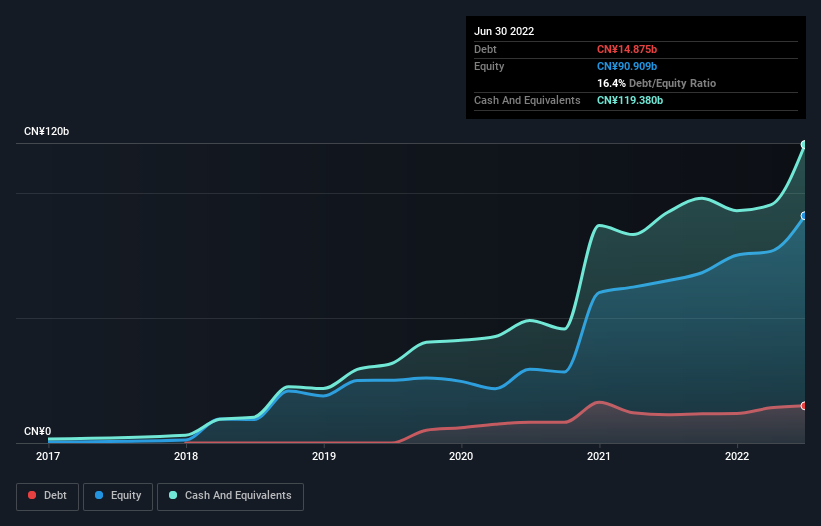- United States
- /
- General Merchandise and Department Stores
- /
- NasdaqGS:PDD
Pinduoduo (NASDAQ:PDD) Could Easily Take On More Debt
Legendary fund manager Li Lu (who Charlie Munger backed) once said, 'The biggest investment risk is not the volatility of prices, but whether you will suffer a permanent loss of capital.' When we think about how risky a company is, we always like to look at its use of debt, since debt overload can lead to ruin. We can see that Pinduoduo Inc. (NASDAQ:PDD) does use debt in its business. But should shareholders be worried about its use of debt?
Why Does Debt Bring Risk?
Debt and other liabilities become risky for a business when it cannot easily fulfill those obligations, either with free cash flow or by raising capital at an attractive price. Ultimately, if the company can't fulfill its legal obligations to repay debt, shareholders could walk away with nothing. However, a more common (but still painful) scenario is that it has to raise new equity capital at a low price, thus permanently diluting shareholders. Of course, debt can be an important tool in businesses, particularly capital heavy businesses. When we think about a company's use of debt, we first look at cash and debt together.
See our latest analysis for Pinduoduo
What Is Pinduoduo's Debt?
You can click the graphic below for the historical numbers, but it shows that as of June 2022 Pinduoduo had CN¥14.9b of debt, an increase on CN¥11.3b, over one year. However, it does have CN¥119.4b in cash offsetting this, leading to net cash of CN¥104.5b.

How Healthy Is Pinduoduo's Balance Sheet?
We can see from the most recent balance sheet that Pinduoduo had liabilities of CN¥85.7b falling due within a year, and liabilities of CN¥15.4b due beyond that. Offsetting these obligations, it had cash of CN¥119.4b as well as receivables valued at CN¥4.73b due within 12 months. So it actually has CN¥23.0b more liquid assets than total liabilities.
This surplus suggests that Pinduoduo has a conservative balance sheet, and could probably eliminate its debt without much difficulty. Simply put, the fact that Pinduoduo has more cash than debt is arguably a good indication that it can manage its debt safely.
It was also good to see that despite losing money on the EBIT line last year, Pinduoduo turned things around in the last 12 months, delivering and EBIT of CN¥20b. When analysing debt levels, the balance sheet is the obvious place to start. But it is future earnings, more than anything, that will determine Pinduoduo's ability to maintain a healthy balance sheet going forward. So if you're focused on the future you can check out this free report showing analyst profit forecasts.
Finally, a company can only pay off debt with cold hard cash, not accounting profits. While Pinduoduo has net cash on its balance sheet, it's still worth taking a look at its ability to convert earnings before interest and tax (EBIT) to free cash flow, to help us understand how quickly it is building (or eroding) that cash balance. Over the last year, Pinduoduo actually produced more free cash flow than EBIT. That sort of strong cash generation warms our hearts like a puppy in a bumblebee suit.
Summing Up
While we empathize with investors who find debt concerning, you should keep in mind that Pinduoduo has net cash of CN¥104.5b, as well as more liquid assets than liabilities. And it impressed us with free cash flow of CN¥32b, being 162% of its EBIT. So we don't think Pinduoduo's use of debt is risky. Over time, share prices tend to follow earnings per share, so if you're interested in Pinduoduo, you may well want to click here to check an interactive graph of its earnings per share history.
If you're interested in investing in businesses that can grow profits without the burden of debt, then check out this free list of growing businesses that have net cash on the balance sheet.
New: Manage All Your Stock Portfolios in One Place
We've created the ultimate portfolio companion for stock investors, and it's free.
• Connect an unlimited number of Portfolios and see your total in one currency
• Be alerted to new Warning Signs or Risks via email or mobile
• Track the Fair Value of your stocks
Have feedback on this article? Concerned about the content? Get in touch with us directly. Alternatively, email editorial-team (at) simplywallst.com.
This article by Simply Wall St is general in nature. We provide commentary based on historical data and analyst forecasts only using an unbiased methodology and our articles are not intended to be financial advice. It does not constitute a recommendation to buy or sell any stock, and does not take account of your objectives, or your financial situation. We aim to bring you long-term focused analysis driven by fundamental data. Note that our analysis may not factor in the latest price-sensitive company announcements or qualitative material. Simply Wall St has no position in any stocks mentioned.
About NasdaqGS:PDD
PDD Holdings
A multinational commerce group that owns and operates a portfolio of businesses.
Flawless balance sheet and undervalued.
Similar Companies
Market Insights
Community Narratives




